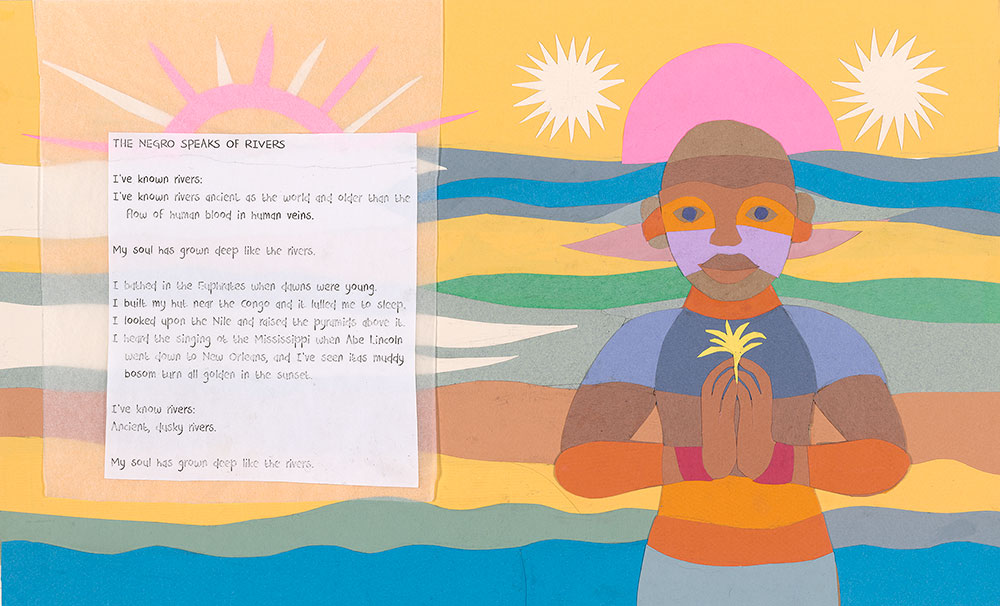 Hughes wrote “The Negro Speaks of Rivers” at the age of nineteen and it was one of his earliest published works, appearing in The Crisis in June 1921. It has become a foundational poem—memorized, recited, studied, sung, illustrated, and read over and over again. Translated into many languages, it is part of the lives of people worldwide.
Hughes wrote “The Negro Speaks of Rivers” at the age of nineteen and it was one of his earliest published works, appearing in The Crisis in June 1921. It has become a foundational poem—memorized, recited, studied, sung, illustrated, and read over and over again. Translated into many languages, it is part of the lives of people worldwide.
Ashley Bryan (1923–2022)
The Negro Speaks of Rivers (from Sail Away), 2015
Collage of cut colored papers with graphite and printed text mounted on a tracing paper overlay
The Morgan Library & Museum, Gift of the Ashley Bryan Center; 2021.25:17
© 2022 The Ashley Bryan Center. Used with Permission. All Rights Reserved.
Sandy Campbell: The story of how Hughes came to write “The Negro Speaks of Rivers,” which he tells in this recording, is disarmingly simple: a young man on a train, traveling between countries, and thinking about the rivers he crosses. From this experience came one of the most important poems he would ever write.
Langston Hughes: Well, no sooner had I gotten out of high school than I went to live in Mexico with my father. My father and mother were divorced when I was quite small and he sent for me to come to Mexico, promising to send me to college. I stayed a year in Mexico, and I wrote two or three very short poems about Mexico. But the most famous of my poems, “The Negro Speaks of Rivers,” was written on a train going to Mexico. We were crossing the Mississippi River, just outside of St. Louis, and I looked out the window of this train and I saw this great muddy river flowing down toward the heart of the south and I began to think about what this river had meant to the negro people in the past. I remembered, my grandmother told me that, in slavery time, to be sold down the river was just about the worst thing that could happen to a slave, sold into the rice swamps of Louisiana, the heat of the Delta. And then I'd read of course about Abraham Lincoln going down the Mississippi River and how Lincoln had seen slavery at its worst when he was a young man, seen the slave markets in New Orleans. And of course, we know that many years later, Lincoln signed the Emancipation Proclamation. So all of this came to my mind, and I took out an envelope, my father's letter really, out of my pocket. And on the back of his envelope I wrote this poem. Well now, most of my poems are written that way. They're what you might call spontaneous or improvisational poems, I guess. I'm not the kind of poet who studies and ponders and, and works in, in strict forms. And I'm not against writing in the sonnet form or the rondeau, or whatever forms you may be able to master – it just hasn’t happened to be my way of writing. This is a free verse poem again, as you will notice. I've known rivers. I've known rivers ancient as the world and older than the flow of human blood in human veins. My soul has grown deep like the rivers. I bathed in the Euphrates when dawns were young. I built my hut near the Congo and allowed me to sleep. I looked upon the Nile and raised the pyramids above it. I heard the singing of the Mississippi when Abe Lincoln went down to New Orleans. And I've seen this muddy bosom turn all golden in the sunset. I've known rivers, ancient, dusky rivers. My soul has grown deep like the rivers.
